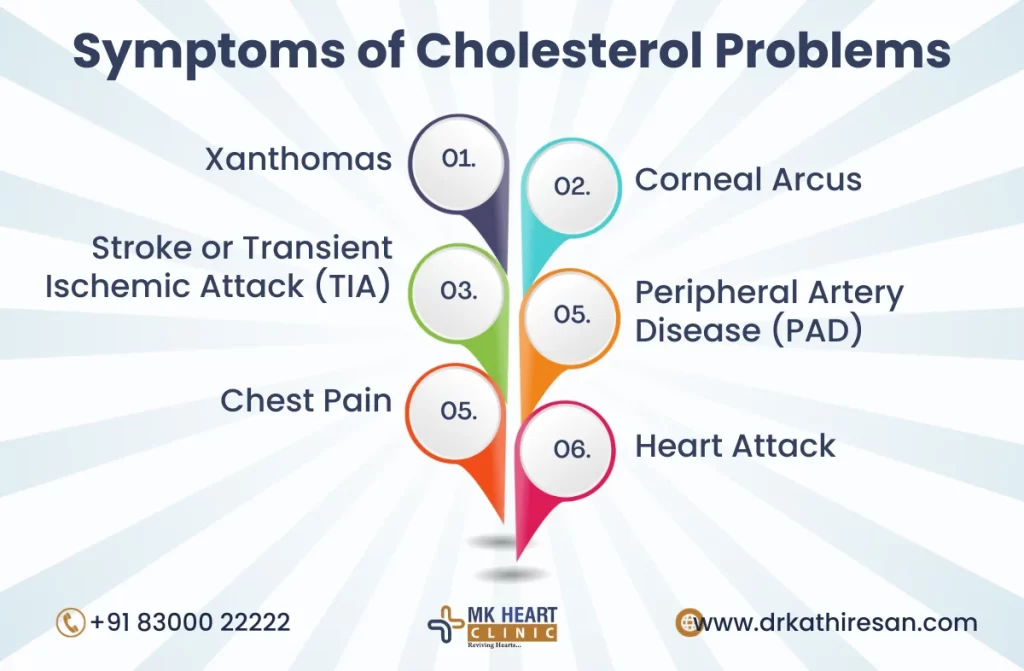Lowering cholesterol through dietary changes is a key strategy in maintaining heart health. High cholesterol levels can increase the risk of heart disease, so it’s crucial to manage cholesterol levels by adhering to the lower cholesterol diet tips effectively.

Lower Cholesterol Diet: 10 Helpful Strategies
Here are ten dietary tips to help you lower cholesterol:
- Choose Heart-Healthy Fats
- While considering a lower cholesterol diet plan, opt for unsaturated fats, such as those found in olive oil, avocados, and nuts, as they can help lower LDL (bad) cholesterol levels. Limit saturated fats and avoid trans fats found in processed and fried foods, as they can raise LDL cholesterol.
- Increase Omega-3 Fatty Acids
- Omega-3 fatty acids, found in fatty fish like salmon, mackerel, and walnuts, can reduce triglycerides and lower blood pressure. Aim to include fatty fish in your lower cholesterol diet at least twice a week.
- Eat More Soluble Fiber
- Soluble fiber, found in foods like beans, oats, lentils, vegetables, and fruits can help lower LDL cholesterol. Incorporate these fiber-rich foods into your daily meals to benefit your heart health.
- Include Sterols and Stanols
- Sterols and stanols are naturally occurring substances found in plants that can block the absorption of cholesterol in the digestive tract. You can find them in fortified foods like some margarines and orange juice. In your lower cholesterol diet plan, you can start consuming 2 grams of sterols or stanols on a daily basis.
- Consume Lean Protein
- Opt for lean protein sources like poultry, fish, and plant-based proteins like tofu and legumes instead of red meat, which often contains saturated fats. Trim visible fat from meat and choose lean cuts.
- Increase Antioxidant-Rich Foods
- Foods high in antioxidants, such as berries, dark chocolate, and spinach, can help reduce inflammation and oxidative stress, which are risk factors for heart disease. A lower cholesterol diet rich in colorful fruits and vegetables provides a variety of heart-protective antioxidants.
- Portion Control and Calorie Awareness
- Maintain a healthy weight by managing portion sizes and being mindful of your calorie intake. Use measuring cups and pay attention to serving sizes on nutrition labels while considering a lower cholesterol diet.
- Limit Added Sugars
- High sugar intake can lead to weight gain and increased triglyceride levels. Reduce your consumption of sugary beverages, candies, and processed foods. Opt for natural sweeteners like honey or fruit in your lower cholesterol diet plan when needed.
- Choose Whole Grains
- Whole grains like oats, barley, quinoa, and whole wheat are rich in fiber and nutrients that can help lower cholesterol levels. Try replacing refined grains with whole grains in your diet.
- Be Mindful of Alcohol Intake
- If you drink alcohol, drink in moderation. Excessive alcohol can raise triglyceride levels and contribute to weight gain. While considering a lower cholesterol diet for heart health, women should limit themselves to one drink per day, and men to two drinks per day.
11 Foods that Lower Cholesterol
- Oats – Packed with soluble fiber, oats reduce bad cholesterol (LDL).
- Nuts – Almonds and walnuts boost good cholesterol (HDL).
- Avocados – Full of heart-healthy fats, they help lower LDL.
- Olive Oil – Replaces saturated fats, lowering cholesterol levels.
- Legumes – Lentils, beans, and peas are high in fiber and protein.
- Fatty Fish – Rich in omega-3s, they lower triglycerides.
- Fruits – Apples, grapes, and strawberries provide pectin, a type of fiber that lowers LDL.
- Soy – Tofu and soy milk can reduce cholesterol levels.
- Dark Chocolate – In moderation, it can help lower cholesterol.
- Tea – Green and black tea contain antioxidants that improve cholesterol.
- Vegetables – Leafy greens like spinach aid in managing cholesterol.
Incorporating these foods into your lower cholesterol diet can significantly improve heart health. Add them to your lower cholesterol diet plan for sustainable results.
Types of Cholesterol
- Low-Density Lipoprotein (LDL) – Known as “bad” cholesterol, high levels lead to plaque buildup in arteries.
- High-Density Lipoprotein (HDL) – Called “good” cholesterol, HDL helps remove LDL from the bloodstream.
- Very Low-Density Lipoprotein (VLDL) – This carries triglycerides and can also contribute to plaque buildup.
- Triglycerides – These fats in the blood are linked to high LDL and low HDL.
- Non-HDL Cholesterol – This is total cholesterol minus HDL, providing an overall measure of “bad” cholesterol.
Understanding these types helps in crafting an effective lower cholesterol diet plan. A balanced lower cholesterol diet targets reducing LDL while boosting HDL for heart health.
Causes of Low Cholesterol
- Genetics – Some people are genetically predisposed to low cholesterol levels.
- Hyperthyroidism – An overactive thyroid can decrease cholesterol levels.
- Malnutrition – A lack of essential nutrients lowers cholesterol production.
- Liver Disease – The liver plays a crucial role in cholesterol regulation, and liver diseases can result in low cholesterol.
- Chronic Illnesses – Conditions like cancer and severe infections may lead to low cholesterol.
While most focus on lowering cholesterol, understanding the causes of low cholesterol is vital for overall health. A well-rounded lower cholesterol diet plan can address various cholesterol-related health issues.
Healthy Eating Tips to Lower Cholesterol
- Eat More Soluble Fiber – Include oats, barley, fruits, and legumes in your meals.
- Choose Healthy Fats – Replace saturated fats with unsaturated fats like olive oil and avocados.
- Limit Red Meat – Opt for lean proteins such as chicken, fish, or plant-based proteins.
- Increase Plant-Based Foods – Add more fruits, vegetables, and whole grains to your diet.
- Reduce Sugar Intake – Minimize sugary drinks and processed foods.
- Use Herbs and Spices – Flavor your food with herbs instead of salt or butter.
Adopting these healthy eating tips can make a significant difference in your lower cholesterol diet. Following a well-balanced lower cholesterol diet plan ensures you maintain heart health and keep cholesterol levels in check.
Conclusion
Remember that dietary changes alone may not be sufficient for some individuals with extremely high cholesterol levels or other risk factors. Medication and lifestyle modifications may be necessary in consultation with a healthcare provider. Implementing these dietary tips for a lower cholesterol diet, along with a heart-healthy lifestyle, can significantly contribute to better cholesterol management and reduced risk of heart disease.

